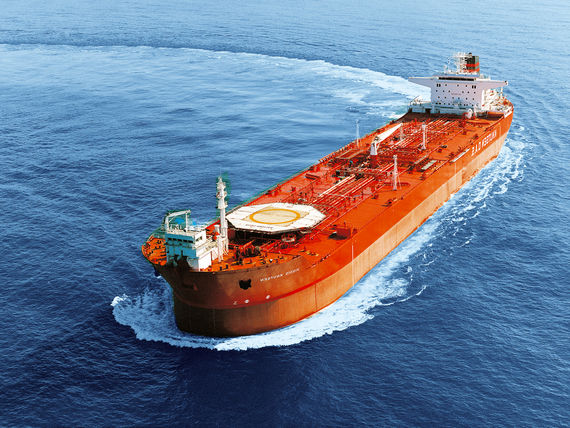IMO clean shipping regulations take effect January 2020

January 8, 2019 - The shipping industry is counting down to the January 1, 2020, sulfur cap, and key regulatory changes to support it are already entering into force. Together with other IMO requirements taking effect this year, they pave the way for cleaner shipping operations globally.
Bunker Delivery Note changes
As of January 1, amendments to the bunker delivery note relating to the supply of marine fuel oil to ships fitted with scrubbers entered into force.
The limit for sulfur in fuel oil will be reduced to 0.50 percent m/m outside emission control areas (ECAs) in 2020, from 3.5 percent currently. In ECAS, the limit will remain at 0.10 percent m/m.
The amendments to Appendix V of MARPOL Annex VI are intended to address situations where the fuel oil supplied does not meet low sulfur requirements but has been supplied to a ship which is using an alternative compliance method permitted under regulation 4 of MARPOL Annex VI (“Equivalents”) to reduce the sulfur oxide emissions of the ship.
The bunker delivery note shall include a declaration signed and certified by the fuel oil supplier's representative that the fuel oil supplied is in conformity with regulation 18.3 of MARPOL Annex VI and that the sulfur content of the fuel oil supplied does not exceed:
- the limit outside ECAs (currently 3.50 percent, falling to 0.50 percent from January 1, 2020) under regulation 14.1;
- the limit in emission control areas (0.10 percent m/m) under regulation 14.4; or
- the purchaser's specified limit value, on the basis of the purchaser's notification that the fuel oil is intended to be used in combination with an equivalent means of compliance or is subject to a relevant exemption for a ship to conduct trials for sulfur oxides emission reduction and control technology research.
The 0.10 percent m/m limit applies in the four established ECAs: the Baltic Sea, the North Sea, North America and the U.S. Caribbean Sea area (around Puerto Rico and the United States Virgin Islands).
In October 2018, IMO’s Marine Environment Protection Committee (MEPC) adopted a further amendment to MARPOL Annex VI, which will prohibit the carriage of non-compliant fuel oil for combustion purposes for propulsion or operation on board a ship - unless the ship has an equivalent compliance method. This amendment is expected to enter into force on March 1, 2020 and will (among other things) amend the form of the International Air Pollution Prevention Certificate (IAPP Certificate), so that it specifies that, for a ship without an approved equivalent arrangement, the sulfur content of fuel oil carried for use on board the ship shall not exceed 0.50 percent m/m as documented by bunker delivery note.
North Sea and the Baltic Sea NOx ECAs
Also on January 1, 2019, amendments to MARPOL Annex VI to designate the North Sea and the Baltic Sea as emission control areas (ECAs) for nitrogen oxides (NOx) entered into force. Both ECAs will take effect on January 1, 2021. In NOx emission control areas, ships are subject to so-called “Tier III” controls to limit NOx emissions.
Data collection on fuel oil consumption begins
From January 1, 2019, ships of 5,000 gross tonnage and above need to start collecting data on their fuel-oil consumption under the mandatory data collection reporting requirements which entered into force in March 2018. The MARPOL Annex VI regulation on Collection and reporting of ship fuel oil consumption data requires ships to collect consumption data for each type of fuel oil they use, as well as other, additional, specified data including proxies for transport work.
The aggregated data is reported to the flag state for each calendar year, and the flag state, having determined that the data has been reported in accordance with the requirements, issues a Statement of Compliance to the ship. Flag states are required to subsequently transfer this data to an IMO Ship Fuel Oil Consumption Database. IMO is required to produce an annual report to the MEPC, summarizing the data collected.
The data collection system is one of the measures taken which will support the implementation of IMO’s Initial IMO Strategy on Reduction of GHG Emissions from Ships, adopted in 2018. The ships covered by the regulation represent approximately 85 percent of the total CO2 emissions from international shipping. The data collection system is intended to support the three-step approach towards addressing CO2 emission from international shipping: data collection, data analysis, followed by decision-making on what further measures, if any, are required.
Solid bulk cargoes (IMSBC) code 2017 amendment enters into force
The 2017 set of amendments (04-17) to the International Maritime Solid Bulk Cargoes Code (IMSBC Code) cargoes entered into force on January 1, 2019. The amendments include requirements for the shipper to declare whether or not a solid bulk cargo, other than grain, is harmful to the marine environment.
Other amendments include updated carriage requirements for a number of specific cargoes and amendments to highlighting the responsibility of the shipper for ensuring that a test to determine the transportable moisture limit (TML) of a solid bulk cargo is conducted.
Source: Maritime Executive


